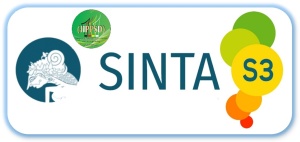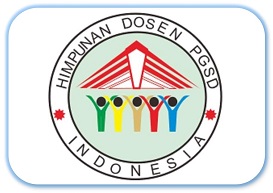Pencapaian Ranah Afektif Self-Efficacy Peserta Didik Sekolah Dasar pada Implementasi Model Pembelajaran Discovery Learning
 ), Yanti Fitria(2),
), Yanti Fitria(2), (1) Universitas Negeri Padang, Kota Padang
(2) Universitas Negeri Padang, Kota Padang (Pengurus HDPGSDI Pusat dan Wilayah II)
 Corresponding Author
Corresponding Author
DOI : https://doi.org/10.24036/jippsd.v7i1.121674
Full Text:
 Language : en
Language : en
Abstract
This study is motivated by the affective aspect of students' self-efficacy which is not high enough. The purpose of this research is to describe the achievement of affective aspects of students' self-efficacy in the implementation of the Discovery Learning model. The hypothesis of this research is that there is an achievement of the affective aspects of students' self-efficacy. This study used the Quasy Experimental Design method using the nonequivalent pretest-posttest control group design. Data collection techniques through self-efficacy questionnaires and final tests. The data analysis technique is the N-Gain test, t-test and regression test. The test results show that: The N-Gain test for the experimental class is 0.314 in the medium category and the control class is 0.197 in the low category. T-test = 8.437 > t-table = 2.014 with an achievement of 77.6%. There is an achievement of student self-efficacy in the implementation of the Discovery Learning model, this can be applied at the beginning of students entering school.
Keywords
References
Ahmad, S., Helsa, Y., & Ariani, Y. (2022). Pendekatan Realistik dan Teori Van Hiele. Padang: Universitas Negeri Padang
Ardianto, D., Hutama, H. A., Boru, M. J., Fachrozi, I., Rodriquez, E. isaci S., Prasetyo, T. B., & Romadhana, S. (2020). Metodologi Penelitian Kuantitatif, Kualitatif, dan Penelitian Tindakan Kela... - Google Books. In Fakultas Ilmu Keolahragaan Universitas Negri Malang.
Arikunto. (2010). Teknik Sampel. In Prosedur Penelitian Suatu Pendekatan Praktik-Revisi ke X.
Arikunto. (2019). Metodelogi Penelitian, Suatu Pengantar Pendidikan. In Rineka Cipta, Jakarta.
Bandura, A. (2017). Cultivate Self-efficacy for Personal and Organizational Effectiveness. In The Blackwell Handbook of Principles of Organizational Behaviour. https://doi.org/10.1002/9781405164047.ch9
Bayır, B., & Aylaz, R. (2021). The effect of mindfulness-based education given to individuals with substance-use disorder according to self-efficacy theory on self-efficacy perception. Applied Nursing Research, 57. https://doi.org/10.1016/j.apnr.2020.151354
Dari, F. W., & Ahmad, S. (2020). Model Discovery Learning Sebagai Upaya Meningkatkan Kemampuan Berpikir Kritis Siswa SD. Jurnal Pendidikan Tambusai, 4(2).
Desyandri, Muhammadi, Mansurdin, & Fahmi, R. (2019). Development of Integrated Thematic Teaching Material Used Discovery Learning Model in V Grade Elementary School. Jurnal Konseling Dan Pendidiikan, 7(1), 16–22. https://doi.org/https://doi.org/10.29210/129400
Efendi, F., Fitria, Y., F, F., & Hadiyanto, H. (2020). Perbedaan Model Problem Based Learning dengan Discovery Learning terhadap Higher Order Thingking Skills dan Self Directed Learning di Sekolah Dasar. Jurnal Basicedu, 5(1). https://doi.org/10.31004/basicedu.v5i1.647
Fitria, Y. (2018). Perubahan Belajar Sains Siswa Sekolah Dasar Pada Pembelajaran Terintegrasi (Terpadu) Melalui Model Discovery Learning. Jurnal Inovasi Pendidikan dan Pembelajaran Sekolah Dasar (JIPPSD), 2(2). https://doi.org/10.24036/jippsd.v2i2.102705
Hasnan, S. M., Rusdinal, R., & Fitria, Y. (2020). Pengaruh Penggunaan Model Discovery Learning dan Motivasi Terhadap Kemampuan Berpikir Kritis Peserta Didik Sekolah Dasar. Jurnal Basicedu, 4(2). https://doi.org/10.31004/basicedu.v4i2.318
Indrawati, T. (2015). PEDAGOGI | Jurnal Ilmiah Ilmu Pendidikan Volume: XV No.2. November 2015. Jurnal Ilmiah Ilmu Pendidikan, XV(1).
Jatisunda, M. G., Suciawati, V., & Nahdi, D. S. (2020). Discovery Learning with Scaffolding To Promote Mathematical Creative Thinking Ability And Self-Efficacy. Al-Jabar : Jurnal Pendidikan Matematika, 11(2). https://doi.org/10.24042/ajpm.v11i2.6903
Lestari, K. E., & Yudhanegara, M. R. (2018). Penelitian Pendidikan Matematika. In PT. Refika Aditama.
Lubis, A. B., Miaz, Y., Taufina, & Desyandri. (2019). Pengaruh Model Everyone Is a Teacher Here Terhadap Aktivitas Dan Hasil Belajar Ips Siswa Sd. Jurnal Basicedu, 3(2), 725–735. https://doi.org/https://doi.org/10.31004/basicedu.v3i2.61
Mohammed, A. (2021). Students’ Speaking Proficiency and Self-efficacy Theory. Advances in Social Sciences Research Journal, 8(2). https://doi.org/10.14738/assrj.82.9660
Mustafa, P. S., Gusdiyanto, H., Victoria, A., Masgumelar, N. K., Lestariningsih, N. D., Maslachar, H.,
Muzria, W., & Indrawati, T. (2020). Pengaruh Model Project Based Learning terhadap Hasil Belajar Siswa pada Pembelajaran Tematik Terpadu Sekolah Dasar. Jurnal Pendidikan Tambusai, 4(3).
Novita, L., Windiyani, T., & Sakinah, A. R. (2020). Pengaruh Penerapan Model Discovery Learning Terhadap Hasil Belajar Matematika Siswa. Widyagogik: Jurnal Pendidikan Dan Pembelajaran Sekolah Dasar, 7(2). https://doi.org/10.21107/widyagogik.v7i2.7441
Öztürk, M., Akkan, Y., & Kaplan, A. (2020). Reading comprehension, Mathematics self-efficacy perception, and Mathematics attitude as correlates of students’ non-routine Mathematics problem-solving skills in Turkey. International Journal of Mathematical Education in Science and Technology, 51(7). https://doi.org/10.1080/0020739X.2019.1648893
Petridou, A., Nicolaidou, M., & Karagiorgi, Y. (2017). Exploring the impact of professional development and professional practice on school leaders’ self-efficacy: a quasi-experimental study. School Effectiveness and School Improvement, 28(1). https://doi.org/10.1080/09243453.2016.1236734
Prasasty, N., & Utaminingtyas, S. (2020). Penerapan Model Discovery Learning Pada Pembelajaran Matematika Siswa Sekolah Dasar. Jurnal Riset Pendidikan Dasar (JRPD), 1(1). https://doi.org/10.30595/.v1i1.7932
Rahmi, R., Febriana, R., & Putri, G. E. (2020). Pengaruh Self-Efficacy terhadap Pemahaman Konsep Matematika Siswa Pada Pembelajaran Model Discovery Learning. Edumatica: Jurnal Pendidikan Matematika, 10(01). https://doi.org/10.22437/edumatica.v10i01.8733
Romlah, S. (2021). Penelitian Kualitatif Dan Kuantitatif (Pendekatan Penelitian Kualitatif dan Kuantitatif). PANCAWAHANA: Jurnal Studi Islam, 16(1).
Sabatini, G., Mahulae, S., Anzelina, D., & Silaban, P. J. (2022). Upaya Meningkatkan Hasil Belajar Peserta Didik Dengan Menggunakan Model Discovery Learning. JURNAL PAJAR (Pendidikan dan Pengajaran), 6(1). https://doi.org/10.33578/pjr.v6i1.8547
Sugiono. (2021). Kerangka Berpikir, konsep, dan hipotesis penelitian. Angewandte Chemie International Edition, 6(11), 951–952.
Suharsimi Arikunto. (2013). Prosedur Penelitian : Suatu Pendekatan Praktik (Edisi Revisi). In Jakarta: Rineka Cipta.
Widoyoko, E. P. (2016). Teknik Teknik Penyusunan Instrumen Penelitian. Yogyakarta. In Yogyakarta: Pustaka Pelajar (Vol. 15, Issue April).
Yazidi, A. (2014). Memahami Model-Model Pembelajaran Dalam Kurikulum 2013 (The Understanding of Model of Teaching in Curriculum 2013). Jurnal Bahasa, Sastra dan Pembelajarannya, 4(1). https://doi.org/10.20527/jbsp.v4i1.3792
Yunita, N., . S., & Anwar, W. S. (2020). Pengaruh Penerapan Model Discovery Learning Terhadap Hasil Pembelajaran Pada Mata Pelajaran Matematika. JPPGuseda | Jurnal Pendidikan & Pengajaran Guru Sekolah Dasar, 3(1). https://doi.org/10.33751/jppguseda.v3i1.2020
 Article Metrics
Article Metrics
 Abstract Views : 471 times
Abstract Views : 471 times
 PDF Downloaded : 210 times
PDF Downloaded : 210 times
Refbacks
- There are currently no refbacks.

This work is licensed under a Creative Commons Attribution 4.0 International License.







